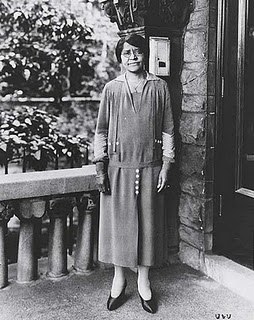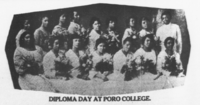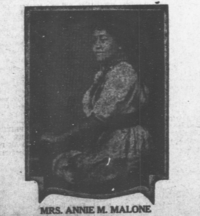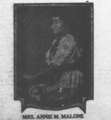Annie Turnbo Malone facts for kids
Quick facts for kids
Annie Turnbo Malone
|
|
|---|---|
 |
|
| Born |
Annie Minerva Turnbo
August 9, 1877 Metropolis, Illinois, U.S.
|
| Died | May 10, 1957 (aged 79) Chicago, Illinois, U.S.
|
| Resting place | Burr Oak Cemetery, Alsip, Illinois |
| Nationality | American |
| Other names | Annie Malone |
| Occupation | Businesswoman, inventor |
| Known for | Development of mail-order process for beauty care products. African American philanthropy. Mentorship of Madam C. J. Walker. Community developer |
Annie Minerva Turnbo Malone (born August 9, 1877 – died May 10, 1957) was an amazing American businesswoman, inventor, and a generous helper of others (philanthropist). She is thought to be one of the very first African American women to become a millionaire. In the early 1900s, she started and grew a huge business. It focused on beauty products and education for African American women.
Contents
Annie's Early Life
Annie Minerva Turnbo was born in Metropolis, Illinois. Her parents, Robert and Isabella Turnbo, had once been enslaved. During the American Civil War, her father fought for the Union army. Her mother, Isabella, bravely escaped from Kentucky with their children. Kentucky was a state that still allowed slavery at the time.
After traveling down the Ohio River, Isabella found safety in Metropolis, Illinois. Annie Turnbo was born on a farm nearby. She was the tenth of eleven children in her family.
Growing Up and Learning
Annie became an orphan when she was young. She went to a public school in Metropolis. In 1896, she moved to Peoria to live with her older sister, Ada Moody. Annie went to high school there and loved chemistry. However, she often got sick and had to leave school.
Even out of school, Annie was very interested in hair and how to care for it. She often practiced hairdressing with her sister. Annie used her knowledge of chemistry and hair care to create her own products. Back then, many women used things like goose fat or heavy oils to straighten their hair. These products often damaged their scalp and hair.
Building a Business
Around 1900, Annie Turnbo moved to Lovejoy, which is now called Brooklyn, Illinois. She kept trying out different hair products. Soon, she developed her own line of hair straighteners, special oils, and hair growth products. These products were made for African American women and did not damage hair.
The Wonderful Hair Grower
She called her new product "Wonderful Hair Grower." To sell it, Annie went door-to-door with bottles of her product. Her products and sales methods changed how African Americans cared for their hair.
In 1902, Turnbo moved to the busy city of St. Louis. There, she and three helpers sold her hair care products door-to-door. To get more customers, she gave away free hair treatments.
Opening Her First Shop
Because so many people wanted her products in St. Louis, Annie opened her first shop in 1902. It was located at 2223 Market Street. She also started a big advertising campaign in black newspapers. She held news conferences and traveled to many southern states. She also hired and trained many women to sell her products.
One of her sales agents was Sarah Breedlove Davis. Sarah later became known as Madam C. J. Walker. She worked for Annie in St. Louis and later in Denver, Colorado. Eventually, they had a disagreement, and Walker left the company. It is said that Walker took Annie's original product recipe and made her own brand.
Protecting Her Products
Because of this, Annie Turnbo decided to copyright her products. She named them "Poro." She did this to stop others from copying her products. The name Poro might come from a Mende word for a special group, or it might be a mix of her married name and her sister's name. As her business grew, Turnbo moved to a bigger building in 1910.
Poro College: A Place to Learn and Grow
In 1918, Annie Turnbo Malone opened Poro College. This was a school for cosmetology (beauty care) and a community center. The large building had many things inside. It had a factory where Poro products were made. There was also a store, business offices, and a big auditorium that could hold 500 people.
The college also had dining rooms, meeting rooms, a roof garden, a gym, a bakery, and even a chapel. It became an important place for the African American community. People used it for religious events and social gatherings.
Education and Job Opportunities
Poro College taught students more than just hair care. They learned about personal style for work, how to walk and talk, and how to dress well. Poro College employed almost 200 people in St. Louis. Through its school and franchise businesses, the college helped create jobs for nearly 75,000 women. These jobs were in North and South America, Africa, and the Philippines.
Facing Challenges
Annie's business did very well until 1927. That year, her husband filed for divorce. He had been the president of the company and wanted half of its value. He claimed his work was key to its success. The divorce case forced Poro College into a legal process where a court oversaw the business.
With help from her employees and important people like Mary McLeod Bethune, Annie reached an agreement. She paid $200,000 and remained the only owner of Poro College. The divorce was then granted.
After the divorce, Annie moved most of her business to Chicago. She bought a whole city block there. More legal problems followed. In 1937, during the Great Depression, a former employee sued her. This person also claimed credit for Poro's success. To get money for the settlement, Annie Turnbo Malone sold her property in St. Louis. Even though her business became smaller, it still did well.
Helping Others
Annie Turnbo married Nelson Pope in 1902, but they divorced in 1907. On April 28, 1914, she married Aaron Eugene Malone. He was a former teacher and sold religious books.
By the 1920s, Annie Turnbo Malone was a very rich woman. In 1924, she paid almost $40,000 in income tax. This was said to be the highest in Missouri at the time. Even though she was very wealthy, Malone lived simply. She gave thousands of dollars to the local black YMCA and the Howard University College of Medicine in Washington, D.C.
Supporting Children
She became a big supporter of the St. Louis Colored Orphans Home. She was the president of its board of directors from 1919 to 1943. With her help, the Home bought a new building in 1922. This street was later renamed Annie Malone Drive in her honor.
The Orphans Home is in a historic neighborhood called The Ville. The building was improved and made bigger. It was renamed the Annie Malone Children and Family Service Center. Besides funding many programs, Annie Turnbo Malone made sure her employees, all African American, were paid well. She also gave them chances to move up in their jobs.
Legacy and Memory
Annie Turnbo was made an honorary member of the Zeta Phi Beta sorority. She also received an honorary degree from Howard University.
On May 10, 1957, Annie Turnbo had a stroke and passed away at Chicago's Provident Hospital. She did not have children. She left her business and the money she had left to her nieces and nephews. When she died, her estate was worth $100,000.
Today, St. Louis holds an annual Annie Malone parade. This parade helps raise money for children's charities.
Images for kids
 | Lonnie Johnson |
 | Granville Woods |
 | Lewis Howard Latimer |
 | James West |






